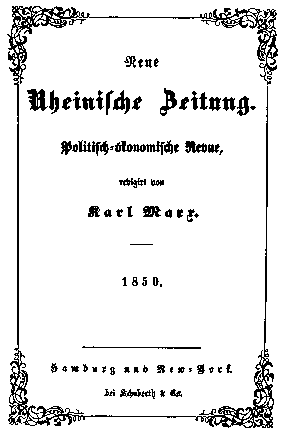
Works of Karl Marx, 1850

Written: by Marx and Engels, 1850;
Translated by: Progess Publishers;
HTML Mark-up: Andy Blunden and Sally Ryan;
In May 1849, when the counter-revolution was on the upsurge, the Prussian Government issued an order expelling Marx and the other editors of the Neue Rheinische Zeitung from Prussia. This measure, prepared well in advance, was applied when the main uprisings in the Rhine Province had been virtually suppressed. On his return to Cologne in April 1848, Marx applied for Prussian citizenship which he had been forced to renounce in 1845 when he was living in Belgium as an emigrant. Despite the Cologne Magistrate’s favourable reply to his application, however, the Cologne royal district authorities and the Minister of the Interior refused to grant it, and Marx remained a “foreigner”, who could at any moment be accused of abusing hospitality and expelled. The royal district authorities’ note to this effect followed on May 11, 1849, and on May 16 Marx was given 24 hours to leave Prussia. Weerth and Dronke, who did not enjoy Prussian citizenship either, received similar orders. Legal proceedings were instituted against Engels for his part in the Elberfeld uprising.
After the Neue Rheinische Zeitung, which had been published by Marx and Engels in Cologne from June 1, 1848, till May 19, 1849, was banned Marx did not give up the idea of resuming, in one way or another, the publication of a paper that would continue the revolutionary traditions of the Neue Rheinische Zeitung. He wrote about this to Engels in Switzerland on August 1, 1849, inviting him to London to help start one up. Marx succeeded in raising funds and finding a publisher, and in mid-December 1849 a contract to publish the Neue Rheinische Zeitung. Politisch-ökonomische Revue was signed between the responsible publisher Konrad Schramm and Schuberth and Co., a Hamburg bookselling firm. The periodical’s aims were to assess the results of the 1848-49 revolution, to reveal the nature of the new historical situation, and to develop further the party’s tactics. Most of the articles and literary and international reviews were written by Marx and Engels, who also drew contributions to the Revue from their supporters Wilhelm Wolff, Joseph Weydemeyer, and Johann Georg Eccarius. Issue No. 1 also carried an item by Karl Blind, “Oesterreichische und preussische Parteien in Baden”, and issue No. 4, verses by the French democrat Louis Ménard.
The cover named the places of publication as London, where Marx and Engels lived at the time, Hamburg, where the journal was printed, and New York since a great number of those who had participated in the 1848-49 revolution in Germany, emigrated to America, and Marx and Engels hoped to find suitable ground there for distributing the journal. Presuming the possibility of a new revolutionary upsurge, they intended shortly to make their publication a weekly, and later a daily newspaper. This plan was not, however, carried out. Altogether six issues were published; the last issue, a double one (5-6),came out at the end of November 1850. All further attempts to continue publication were blocked by police persecution in Germany and lack of funds.
Marx sent the text of the Announcement to Joseph Weydemeyer in Frankfurt am Main on December 19, 1849, with a request to publish it in the Neue Deutsche Zeitung. It was printed on January 16 and 26, and February 5, 1850.
It was also printed in the Berner Zeitung of December 27, 1849; in the Westdeutsche Zeitung (published by Hermann Becker in Cologne) on January 8, 9, 11 (supplement), 12 and 13 (supplement), 1850; in the Schweizerische National-Zeitung, Basle, January 10, 1850; in the Dusseldorfer Zeitung, January 10, 1850; in the Norddeutsche Freie Presse, Hamburg-Altona, January 18, 1850; in Der Volksfreund, Lemgo, January 18, 1850.
Issue No. 1.
Announcement
Class Struggles in France
Part 1
The Campaign for the German Imperial Constitution Part 1 (Engels)
Issue No. 2.
Review, January-February 1850
I. G. Fr Daumer, Die Religion des neuen Weltalters. Versuch einer combinatorisch-aphoristischen Grundlegung;
II. Ludwig Simon of Trier, Ein des Rechts fur alle Reichsverfassungskampfer an die deutschen Geschwornen
III. Guizot, Pourquoi la revolution d'Angleterre a-t-elle reussi? Discours sur le histoire de la revolution d'Angleterre
The Campaign for the German Imperial Constitution Part 2 (Engels)
Class Struggles in France Part 2
Issue No. 3.
The Campaign for the German Imperial Constitution Part 3 (Engels)
Class Struggles in France Part 3
Issue No. 4.
Review, March-April 1850
I. Latter-Day Pamphlets, Edited by Thomas Carlyle
II. Les Conspirateurs, par A. Chenu; ex-capitaine des gardes du citoyen Caussidière.
III. Le socialisme et l'impôt, par Emile de Girardin
The Ten Hours' Bill (Engels)
Louis Napoleon and Fould (Marx)
Gottfried Kinkel (Marx & Engels)
Editorial Note (Marx & Engels)
Statement (Marx & Engels)
Two Years of a Revolution; 1848 and 1849 (Engels)
Issue No. 5-6
Review, May-October 1850 (Marx & Engels)
On the Slogan of the Abolition of the State (Draft by Engels)
Class Struggles in France Part 4
The Peasant War in Germany
The Peasant War in Germany (Marx: 5-6)
I. The Economic Situation and Social Classes in Germany
II. The Main Opposition Groups and their Programmes; Luther and Münzer
III. Precursors: Peasant Uprisings, 1475-1517
Class Struggles in France (Marx: 1, 2, 3 & 5-6, also known as “1848-1849”)
I. The Defeat of June 1848
II. June 13,1849
III. Consequences of June 13,1849
IV. The Abolition of Universal Suffrage in 1850
The Campaign for the German Imperial Constitution (Engels: 1, 2 & 3)
I. Rhenish Prussia
II. Karlsruhe
III. The Palatinate
IV. To Die for the Republic!